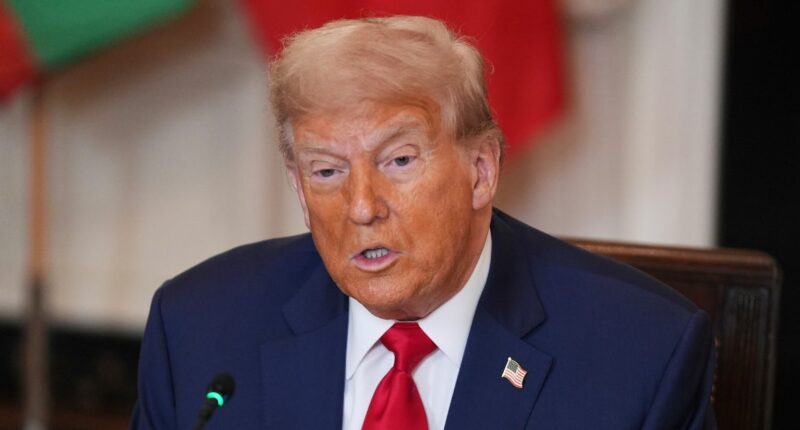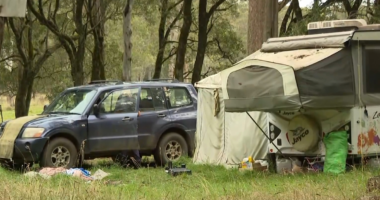Share this @internewscast.com
President Donald Trump speaks during a lunch with African leaders in the State Dining Room of the White House, Wednesday, July 9, 2025, in Washington (AP Photo/Evan Vucci).
The legal tug-of-war between the Trump administration and the federal judicial system witnessed a significant development as the U.S. Court of Appeals for the 9th Circuit decided to revisit a contentious case. This case revolves around the deployment of state National Guard troops in American cities, a move that has sparked a series of legal challenges. Initially, a three-judge panel ruled in favor of the federal government, but this decision has now been set aside pending a full court rehearing.
On Tuesday evening, the 9th Circuit’s full bench voted to rehear the case en banc, effectively nullifying the previous ruling. Chief U.S. Circuit Judge Mary Murguia, appointed by Barack Obama, announced the decision to vacate the earlier judgment, indicating a fresh review of the case was warranted. This action signals the court’s intention to delve deeper into the complexities of the matter at hand.
The order issued by the appellate court was succinct, stating, “Upon the vote of a majority of nonrecused active judges, it is ordered that this case be reheard.” This brief but potent directive underscores the seriousness with which the court is approaching the case, recognizing the broader implications of its outcome.
This latest development marks the second instance where the 9th Circuit has effectively nullified the initial stay that favored the Trump administration. Such moves highlight the ongoing judicial scrutiny of federal actions concerning the deployment of National Guard troops, a topic that has stirred significant debate.
The origins of this litigation trace back to September 28, when Oregon filed a lawsuit challenging the legality of troop deployments to Portland. The suit was based on claims of violations of statutory law, the Administrative Procedure Act (APA), and constitutional grounds. Oregon’s legal action reflects broader concerns over federal authority and its intersection with state rights, a theme that continues to resonate in the current political landscape.
The underlying litigation was filed on Sept. 28, premised on alleged violations of statutory law concerning troop deployments, the Administrative Procedure Act (APA), and the Constitution. Originally, only Oregon sued to stop the deployment of troops to Portland.
On Oct. 4, U.S. District Judge Karin Immergut, an appointee of President Donald Trump during his first term in office, granted a temporary restraining order (TRO) that expired on Oct. 18. The court’s order barred “the federalization and deployment of Oregon National Guard service members.”
The Trump administration immediately appealed to the U.S. Court of Appeals for the 9th Circuit seeking a stay and, later that same night, apparently tried an end-run around Immergut’s restraining order by communicating its intent to use 200 members of the California National Guard in Portland in lieu of the Beaver State’s own troops.
On Oct. 5, in response to the threat of Golden State troops being activated, California joined the litigation and filed an amended complaint as well as a second motion for a temporary restraining order — which Immergut granted that very same day.
The second restraining order, more broadly, enjoined the government “from deploying federalized members of the National Guard in Oregon.” And, similarly, it expired on its own terms on Oct. 19.
On Oct. 15, after a hearing, the district court found “good cause to extend” both of its own temporary restraining orders — pending the results of the then-ongoing appeal with the 9th Circuit.
On Oct. 20, the three-judge panel voted to stay the first restraining order in a clear win for the White House. The 2-1 majority decision was penned by Trump-appointed U.S. Circuit Judge Bridget S. Bade, with a concurrence by Trump-appointed U.S. Circuit Judge Ryan D. Nelson. In dissent was Bill Clinton-appointed U.S. Circuit Judge Susan P. Graber.
On Oct. 23, attorneys for Oregon alerted the appellate court to an issue with some of the figures provided by the U.S. Department of Justice in service of the government’s winning stay request.
“Plaintiffs write to alert the Court of a material factual error by defendants on which the panel relied to grant a stay pending appeal,” the citation of supplemental authorities reads. “Given that reliance, and the gravity of the interests at stake, plaintiffs ask that the panel immediately withdraw its order or, in the alternative, that the en banc court immediately vacate it.”
In that post-hearing discovery, the government “admitted that 115 FPS officers have never been redeployed to Portland.” Rather, the Beaver State says, “[o]nly a fraction of that number was ever in Portland at any given time before the President’s directive.” Citing four separate time frames, the discovery showed deployments of 27 officers, 31 officers, 29 officers, and 20 officers in Portland at any given time between the middle of June and end of October.
On Oct. 24, the full 9th Circuit administratively stayed, or paused, the panel’s own stay – “[w]ithout objection from the panel.”
On Oct. 27, the DOJ admitted multiple prior representations about federal deployments to Portland were “incorrect” and expressed “regret” for making numerous such “errors” in various court filings.
So, after the week-plus of missteps, the full 9th Circuit will have a chance to consider the merits of the first Immergut TRO. Notably, however, the second Immergut TRO has remained in effect the entire time – despite some protestations to the contrary due to the original, since-vacated, panel decision.
While the second restraining order was not appealed by the federal government or formally considered by the trio of judges, the panel strongly suggested that order should be paused as well.
“The district court stated that it granted the second TRO based on the same legal reasoning it provided in its order issuing the first TRO,” the panel’s opinion reads. “Defendants are thus correct that the first TRO and the second TRO rise or fall together on the merits of the issues raised in this motion for a stay pending appeal.”
Now, no matter what collection of circuit judges on the 9th Circuit have weighed in or how, the first TRO is in full effect, once again.















